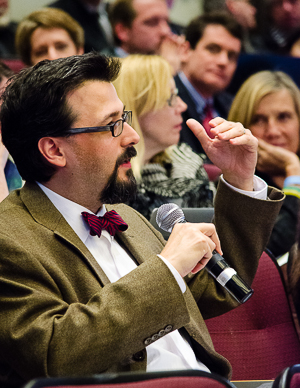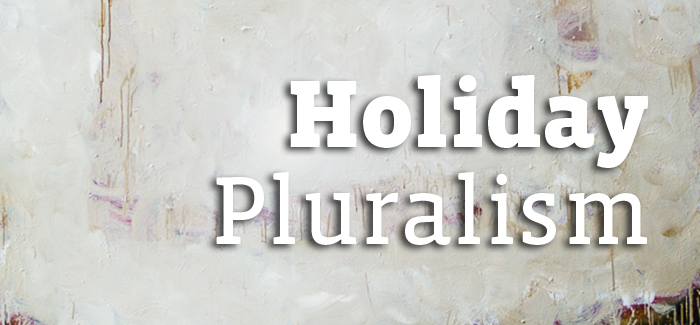Welcome to a season where decorative lights are shaped like candy canes instead of crosses and the carols we sing exult the snow, as well as Jesus, Mary and the three wise men. Embrace it – this is what holiday pluralism looks like. What does it mean? And why does it matter? Law professor Víctor Muñiz-Fraticelli explains.
The scene across most Canadian cities is pretty predictable at this time of year: night falls early, punctuated only by the chilly glow of snowy streets and colourful holiday lights. Do you notice if people wish you “Happy Holidays” instead of “Merry Christmas” or “Happy Chanukah”? Víctor Muñiz-Fraticelli notices, and he welcomes it.

To Muñiz-Fraticelli, the holiday season is an excellent time to think about a subject dear to his heart, that of pluralism. He recently published a book entitled The Structure of Pluralism (Oxford University Press), which was launched at Montreal’s Paragraphe bookstore in November, and has also opined in the McGill Law Journal on the subject of freedom of religion in Quebec (podcast here).
One of the tenets of pluralism, he explains, is that the rules and codes that we follow – be they formal laws or codes of etiquette such as how to set the dinner table – come from many different sources. Sometimes these rules and codes are in agreement, sometimes they overlap, and sometimes they are in direct conflict with one another.
When these different codes come into contact, the results are interesting, he points out. Christmas, for example, celebrates the birth of Jesus but the reasons for dating it to December 25 probably have more to do with the intersection of the Roman Empire and Christianity.
“As far as I know, and someone with greater religious knowledge can correct me, there is no clear evidence that Jesus was born in December,” he says. “But there is very clear evidence that December 25th or thereabouts was the festival of the Sol Invictus, a central festival in the Roman calendar celebrating the sun. So when Christianity became identified with the Roman Empire, that imagery of the Sol Invictus was incorporated.”
The symbolism of the holiday in the Northern hemisphere is also a strong one, especially because of winter. “It is wretched outside, the days have been getting shorter and right around the moment when the days start getting longer, we have a big party,” Muñiz-Fraticelli says. “Many people throughout history have had a similar reaction. If we think of life as a fire inside, then we also see that the Jewish tradition through Chanukah represents that extension of hope in the form of fire.”
“All these events in each tradition are supposed to happen independent of the seasons, but if we recognize the social function of legal institutions and symbols, we begin to understand the overlap,” he points out, adding his hope that logic be a driving force behind these conversations.
If we can accept some religious expression in public – these lights, the cross – then we should also be able to accept their expression in the form of a sukkah, for example. And if we insist that religious symbols should be private, as was the argument in the now-defunct Quebec Charter of Values, then we should be willing to keep all such expression, including crosses and Christmas trees, private.
Muñiz-Fraticelli is especially wary when the argument shifts from religion to aesthetics, identity, and cultural values, because it leads to the idea that the only people who have the right to shape the history and identity in Quebec are “the descendants of the 8,500 individuals who came here during the colonial era and everyone who arrived afterwards came in as a second-class guest.”
Even with this strong common ground for a holiday in December, there is much debate about how to best celebrate it. For Muñiz-Fraticelli, the most important message at this time of year is that joy is expressed in many different ways.
“If someone says ‘Season’s Greetings’ or ‘Happy Holidays,’ it is not a denial of the truth of your religious beliefs,” he said. “Likewise, if you are not religious or not Christian and someone says ‘Merry Christmas’ to you, see it as a sentiment of goodwill.”
A pluralistic view of the world holds that there are many meanings that can be attached to words and symbols. “Just as you are not entitled to impose your meaning on others, you are not obligated to take someone else’s meaning as governing your own life,” he explains. “It’s cold enough outside – people should take the good feelings of the season to heart!”
[ JUMP TO THE CURRENT EDITION OF FOCUS ONLINE ]

